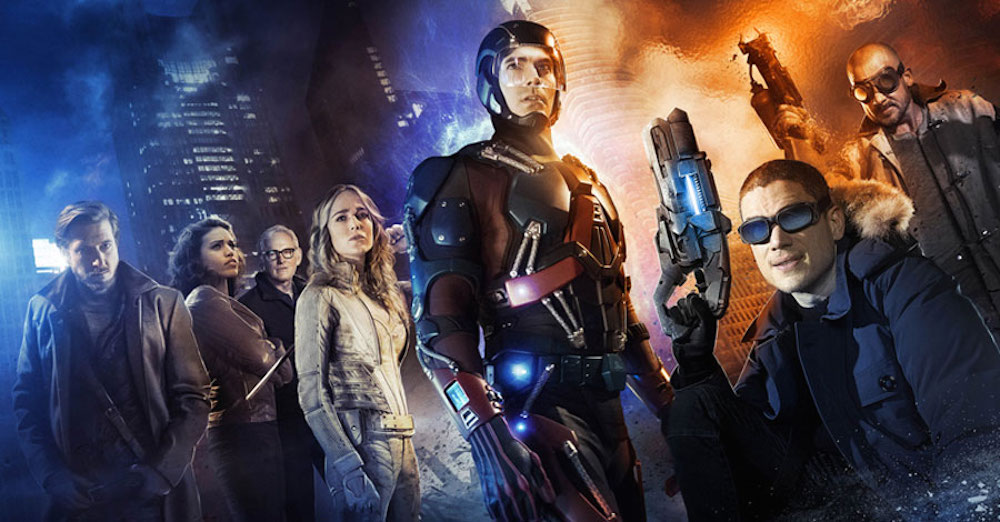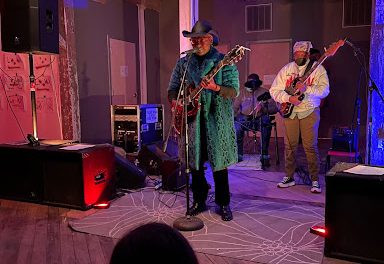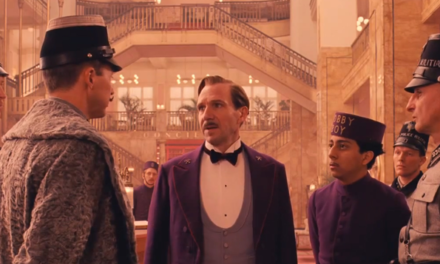Legends of Tomorrow is perhaps the biggest indication of how far the DC CW Universe has come. An interconnected network of shows that began with Arrow and quickly had its whole mythology blown up by the time-traveling, dimension-hopping, psychic-gorilla-fighting thrill ride that is The Flash, Legends of Tomorrow embraces its comic book roots in a way that none of these shows could have ever dreamed of at their start.
Faced with the threat of immortal madman Vandal Savage (Casper Crump), the greatest threat that Earth has ever faced, Time Master Rip Hunter (Arthur Darvill) must assemble a collection of heroes to travel through time and space to stop Savage before he can take over and destroy the world.
Atom (Brandon Routh), Firestorm (Victor Garber and Franz Drameh), Hawkman (Falk Hentschel), Hawkgirl (Ciara Renee), White Canary (Caity Lotz), Heat Wave (Dominic Purcell) and Captain Cold (Wentworth Miller) are what Rip gets — a group of ragtag supporting characters from Arrow and The Flash set adrift and asked to become heroes. All of them have either struggled with what heroism means or, in the case of Captain Cold and Heat Wave, never even considered it.
The ultimate charm of Legends of Tomorrow comes from its wholehearted embrace of its comic-book roots and its eager willingness to constantly lean into the soapy and silly melodrama and often barely coherent sci-fi aspects that the show seems eager to borrow from Doctor Who as well as the Silver Age of Comic Books. It’s a show that’s so unceasingly unironic that you can’t help but love what it’s doing.
It’s a show where a young scientist in a shrinking super suit, an old scientist and a young mechanic who fuse together to form a radioactive man, two reincarnated Egyptian lovers with wings and anger issues, a resurrected assassin and two thugs with guns that shoot rays of heat and cold are led by a time-traveling cowboy to fight an immortal Egyptian priest. There’s not an ounce of attempt to go back on or explain these things or make them realistic or “less silly.” The show simply presents their adventures, and you can’t help but smile as it happens.
Legends of Tomorrow is fortunate in that good will because it helps keep the viewer on its side through the shakiness of the pilot. While the show had much of its character legwork done by Arrow and The Flash, the pilot seems less confident in its plot legwork, and spends much of the first episode simply putting the team into place, which ends up dragging down the episode as a whole.
I understand the need for establishment of premise in a pilot — that’s its primary function. But the pilot for Legends of Tomorrow hinges around a central conflict that has no true conflict. The episode asks whether this team will come together on the missions, which of course they will — otherwise, there isn’t a show. One wishes that they had been more willing to lean into the conflict between these disparate heroes rather than the mere assembling of the team.
This leads into the other problem that Legends of Tomorrow seems to face at the current juncture, which is a distinct lack of ideas about its premise. Arrow and The Flash succeeded because they so quickly announced the central ideals behind their shows. Arrow is a story about revenge and legacy, and The Flash is a show about trust and the joys and pains of doing the right thing.
But Legends of Tomorrow doesn’t quite have its ideal woven into the fabric of the show yet. Some dialogue thrown towards the idea of second chances and rewriting your history appeared in the pilot, but it isn’t sold, feeling more like exposition and plot than any thematic resonance. It leaves Legends of Tomorrow wandering in search of something to be about, and adds an unfortunate weightlessness to the proceedings as they currently stand.
No more does this show than in the villain the first episode decides to give us. A silent Boba Fett knock-off named Chronos provides the main antagonistic thrust. Without those thematic resonances, however, he’s just a faceless gun, one the show seems to drop because it’s time for action. Legends of Tomorrow seems more plot-driven than any show from this team in the past. We grew to love Arrow and The Flash because of the characters and the thematic work being done, not necessarily because of the oft weak plotting. Perhaps too many characters and stories in Legends of Tomorrow have moved to that plot-based focus.
That being said, it isn’t as though Legends of Tomorrow is devoid of much of the charm found in its predecessor shows. The characters remain markedly similar to their original incarnations, all of whom were usually the most enjoyable and watchable part of any episode they did. Captain Cold and Heat Wave in particular retain their absolutely amazing scene-chewing nature and excel at keeping things turned up to 11 no matter the situation.
The two particularly shine during a late-episode scene with Caity Lotz’s White Canary, in which they sneak out to a bar in the 70s while the rest of the team is off looking for an expert on villain Vandal Savage, and get into a bar brawl. All three seem to have an effortless and fun chemistry. And it was this moment that showed the potential of the show: characters who have never before interacted in their respective shows in new and exciting locations and situations.
If Legends of Tomorrow can keep that up and add some meaning to it, this one stands the chance of being the most effusive fun DC has created yet. But as of now, Legends of Tomorrow is going to need a bit of work to stand alongside the rest of the week’s DC television. With a strong cast and unironic love of its premise, though, I believe it can get there.
Grade: B-
Opinion Editor | Brandon Wagner is a College Senior from God Only Knows Where, America studying Film and Media Studies with a minor in Religion. This is his first year for the Wheel, in a likely misguided experiment to be a film critic. When he's not writing on the biggest blockbusters or the films of Spike Jonze or Andrei Tarkovsky or Zack Snyder, he's writing on comedic television, the future of gaming as an art, or the relationship between audience and cinematic experience. In other words, Brandon Wagner has basically nothing else going on but this.






